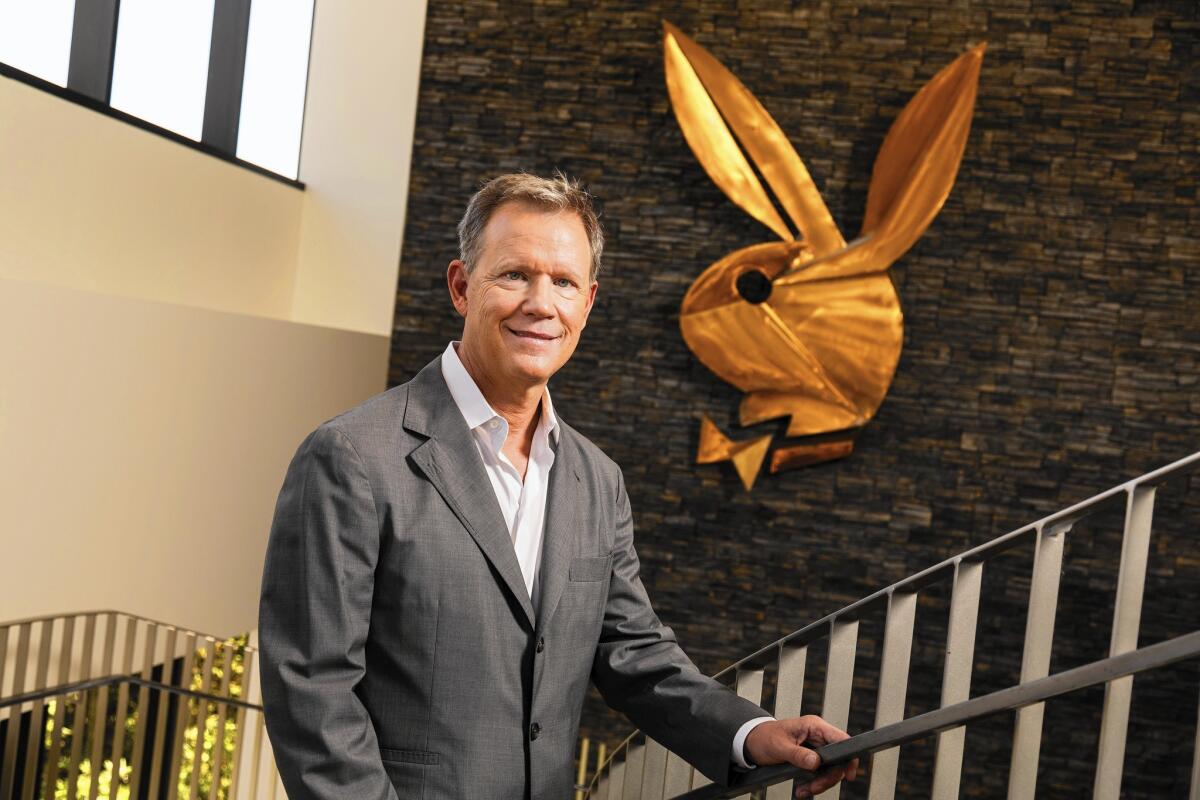How I Made It: At revamped Playboy, he works to build the brand

- Share via
The gig: Since 2009, Scott Flanders, 58, has been chief executive at Playboy Enterprises, the privately held company founded by Hugh M. Hefner in 1953. Playboy has made a comeback recently, capitalizing on one of the world’s most recognizable brands. Last year, products bearing the Playboy name or bunny logo amassed nearly $1 billion in sales.
Less skin: The latest change in the Playboy empire, announced last week, was that Playboy magazine would stop publishing nude photos as part of a March redesign. “The decision to eliminate nudity evolved organically as we experienced huge audience growth with our non-nude digital experience,” with last year’s relaunch of Playboy.com as a “safe for work” site, Flanders said. “I led the change by challenging the organization to question whether it made sense to have a different treatment in print than what was winning with our millennial digital audience.”
Loving L.A.: The last six years have seen the company downsize its workforce by 75% and close its Chicago headquarters and New York office. Playboy chose to consolidate in Southern California, with a headquarters in Beverly Hills, “because our business is about talent. This is where the talent is found,” Flanders said. Playboy now has about 216 employees.
Getting the job: Flanders beat 167 other candidates to become the first non-Hefner to head Playboy, after the retirement of Christie Hefner. “I was described earlier in my career as pond water — I’m an inch deep and a mile wide. I had very broad experience in difficult situations. I let them know this was a business that appealed to my insatiable curiosity.”
Action plan: “I interviewed the top 68 executives at Playboy,” Flanders said. “I talked to Larry Flynt — who thought we should do strip clubs. I talked to Penthouse. I ended up thinking that Playboy was really a lifestyle brand that wasn’t being exploited as much as it could be.” Reducing costs was not the only reason for consolidation. “I wanted everyone under the one roof,” Flanders said. “In a creative process, you want people bumping into one another. I call it progress by friction.”
Tightrope: In taking on Playboy, Flanders would have to deal with the company’s founder and by far its dominant shareholder in the still very active Hugh M. Hefner, now 89; its private investors; and a workforce that was in for a major shake-up. “There’s no good way to radically downsize an organization,” Flanders said.
Well-positioned: For 20 years Flanders had prepared for this job, taking on companies that needed to revitalize brands and deal with ownership changes. Over that time he served as president of Que Corp., Macmillan Computer Publishing, Simon and Schuster’s reference division, and then went back to Macmillan publishing. Flanders was also chairman and chief executive of Columbia House. He was president of Freedom Communications when he left to take the Playboy job.
Changing course: Flanders grew up in Indianapolis and fell in love with the first college he visited, the University of Colorado at Boulder, where he studied economics. He earned a law degree from the Indiana University School of Law in Bloomington. His one job offer during the recession of the early 1980s was as a tax accountant for PricewaterhouseCoopers. “Never has a fish been more out of water,” Flanders said. “I had to learn how to do math, how to prepare tax returns. It was so hard for me, so technical, and I’m a people person.”
Recognize opportunity: He learned about Que through the tax work and landed a job there. It was one of the first “how to” publishers of computer software books. “We really rode the back of the personal computer revolution,” Flanders said.
Make an impression: After three years at Que, Flanders was tapped to be president of the company and didn’t know why until a few years later, when he saw Macmillan publishing executive Harry McQuillen at a conference. “‘You were the best puppy at the dog pound,’” Flanders recalled him saying, “‘I knew you would make mistakes but that you would do enough right to overcome them.’”
Leadership style: “I race to the middle of what is reasonable and then don’t move,” Flanders said. “People hate it, saying, ‘Wait a minute, you are not negotiating.’ I say, look, I came up with what’s fair instead of you starting here and them starting there. We’re going to end up here anyway, why don’t we just go there now.”
Personal: Flanders lives in Los Angeles with his wife of 29 years, Linda. She is a certified public accountant and an author. When Flanders isn’t hosting parties at the Playboy Mansion, he said, “I’m mountain biking, skiing and golfing, in that order.”
Twitter: @RonWLATimes
More to Read
Inside the business of entertainment
The Wide Shot brings you news, analysis and insights on everything from streaming wars to production — and what it all means for the future.
You may occasionally receive promotional content from the Los Angeles Times.











